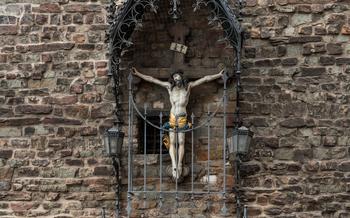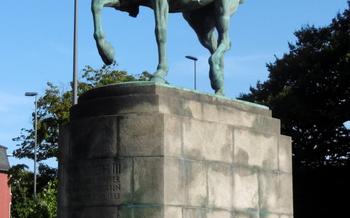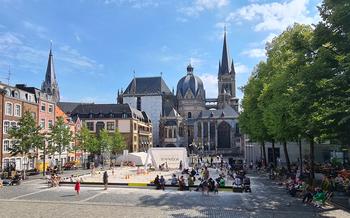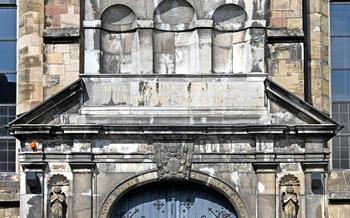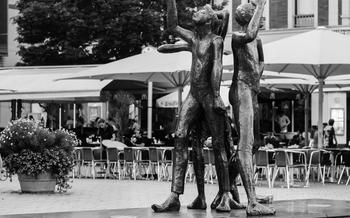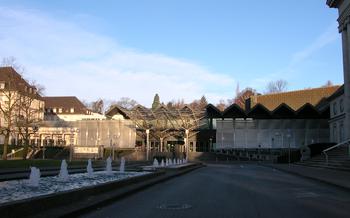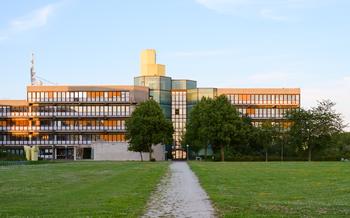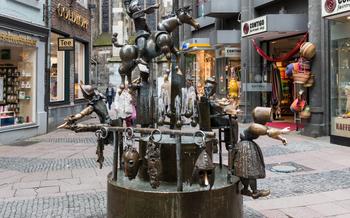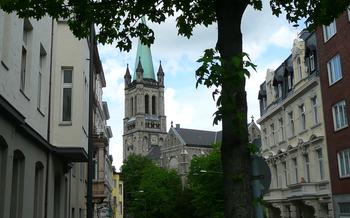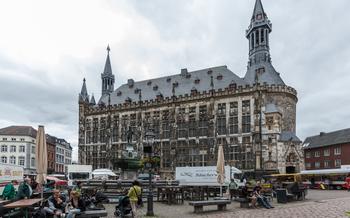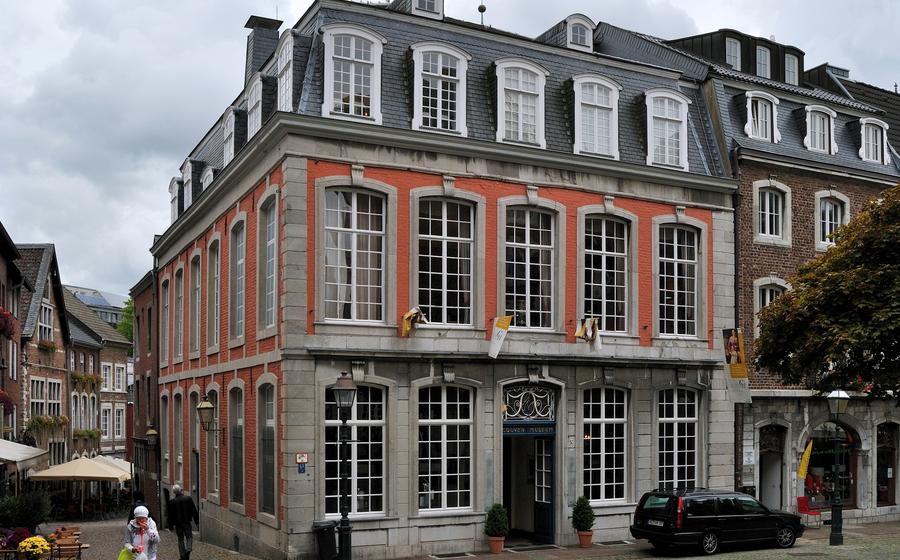
Couven Haus
- Couven Museum
- Architecture and Design
- History and Context
- Exhibitions and Displays
- Furniture and Decorative Arts
- Ceramics and Porcelain
- Family Legacy and Business
- Educational Programs and Workshops
- Guided Tours and Special Events
- Visitor Information and Accessibility
- Nearby Attractions and Points of Interest
- Local Cuisine and Dining Options
- Accommodation and Hotels
- Souvenirs and Gifts:
- Insider Tip:
Couven Museum
The Couven Haus, a stunning example of 18th-century Rococo architecture, stands as a testament to the legacy of the Couven family, who played a pivotal role in shaping Aachen's cultural and economic landscape. The Couven Museum, housed within this magnificent building, invites visitors on a journey through time, showcasing the family's remarkable contributions to art, design, and craftsmanship.
The museum's collection boasts an impressive array of furniture, ceramics, and other decorative arts, each piece carefully selected to tell the story of the Couven family's artistic vision and technical prowess. Immerse yourself in the exquisite craftsmanship of their furniture, adorned with intricate carvings and delicate marquetry. Marvel at the vibrant colors and intricate patterns of their ceramics, which rivaled the finest porcelain produced in Europe at the time.
Beyond the stunning collection, the Couven Museum offers a range of educational programs and exhibitions that delve deeper into the family's history and their impact on Aachen's development. Guided tours provide visitors with insights into the lives of the Couvens and their creative process, while temporary exhibitions showcase the latest research and discoveries related to their work.
Whether you are an art enthusiast, a history buff, or simply curious about the lives of this remarkable family, the Couven Museum promises an unforgettable experience. Step into the world of the Couvens and discover the enduring legacy of their artistic genius.
Architecture and Design
The Couven Haus stands as a testament to the architectural prowess of the Couven family. Its striking Rococo facade, characterized by intricate carvings and delicate stuccowork, immediately captures the attention of visitors. The interior of the building is equally impressive, showcasing elegant rooms adorned with ornate plasterwork, parquet floors, and grand fireplaces. The Couven family's influence on Aachen's architectural landscape is undeniable, as their designs helped shape the city's unique character. The Couven Haus serves as a prime example of 18th-century design and craftsmanship, demonstrating the family's mastery of both aesthetics and functionality. The restoration and preservation efforts undertaken to maintain the building's original character have ensured that this architectural masterpiece continues to inspire and captivate visitors to this day.
History and Context
Aachen, a city steeped in history, played a pivotal role as a center of trade and culture in the Middle Ages. Its strategic location at the crossroads of major trade routes made it a hub for merchants and artisans. The Couven family, with their entrepreneurial spirit and innovative ideas, thrived in this vibrant environment. Their textile factory, established in the 17th century, revolutionized the city's textile industry. The family's success extended beyond textiles; they ventured into ironworks, mining operations, and other industries, contributing significantly to Aachen's economic prosperity.
The Couvens were not merely successful entrepreneurs; they were also deeply engaged in the city's social and cultural development. They supported educational institutions, charitable causes, and the arts, leaving a lasting impact on Aachen's cultural landscape. Through their patronage, they fostered the growth of the city's artistic community, attracting talented artists and craftsmen who further enriched Aachen's cultural heritage.
Despite the challenges posed by historical events such as the French Revolution and the Industrial Revolution, the Couven family's legacy endured. Their business acumen and commitment to quality ensured their enterprises remained competitive, adapting to changing economic and technological landscapes. The Couven Haus, a testament to their enduring influence, stands as a symbol of their dedication to craftsmanship, innovation, and the pursuit of excellence.
Exhibitions and Displays
The Couven Museum presents a variety of exhibitions and displays throughout the year, showcasing the Couven family's legacy and their contributions to art, design, and craftsmanship. These exhibitions explore different themes and periods, highlighting the family's unique style and innovative techniques.
One of the most popular exhibitions is "The Couven Family: Masters of Rococo," which delves into the family's history and their significance as pioneers of the Rococo style in Germany. The exhibition features a selection of furniture, ceramics, and decorative arts, demonstrating the Couven family's exceptional craftsmanship and attention to detail.
Another notable exhibition is "Ceramics and Porcelain: The Couven Legacy," which focuses on the family's significant contributions to the development of ceramics and porcelain in Germany. The exhibition showcases a wide range of ceramic and porcelain objects, including faience, stoneware, and porcelain, highlighting the Couven family's innovative techniques and their mastery of this medium.
The Couven Museum also organizes temporary exhibitions that feature the work of contemporary artists and designers, as well as historical exhibitions that explore different aspects of the Couven family's legacy. These exhibitions offer visitors a fresh perspective on the Couven family's work and its continued relevance in the world of art and design.
The museum's curatorial approach emphasizes storytelling and interactivity, engaging visitors of all ages and backgrounds. The exhibitions are designed to provide an immersive experience, allowing visitors to learn about the Couven family's history, their artistic achievements, and their impact on the cultural landscape of Aachen and beyond.
Furniture and Decorative Arts
The Couven Museum houses an exquisite collection of furniture and decorative arts that showcases the exceptional craftsmanship and artistry of the Couven family. Visitors can admire a wide range of pieces, from elegant Rococo chairs and tables to intricately carved cabinets and mirrors. Each piece is a testament to the Couven family's mastery of design and their ability to create objects that are both beautiful and functional.
The furniture collection includes examples from various styles and periods, including Baroque, Rococo, and Neoclassicism. Visitors can trace the evolution of the Couven family's style as they experimented with different forms and motifs. The pieces are made from a variety of materials, including wood, metal, and porcelain, and feature intricate carvings, marquetry, and gilding.
The Couven family also produced a wide range of decorative arts, including ceramics, porcelain, and metalwork. These objects were often used to complement the furniture and create a cohesive and stylish interior. Visitors can admire exquisite porcelain figurines, delicate faience tableware, and finely crafted metalwork objects, all of which demonstrate the Couven family's commitment to creating objects of the highest quality.
The furniture and decorative arts at the Couven Museum provide a glimpse into the refined and elegant lifestyle of the Couven family and their contemporaries. These objects are not only beautiful works of art but also important historical artifacts that offer insights into the social and cultural history of 18th-century Germany.
Ceramics and Porcelain
The Couven family played a pivotal role in the development of ceramics and porcelain in Germany. They established a faience factory in 1742, producing high-quality faience tiles, tableware, and decorative objects. The Couven family's faience was renowned for its intricate designs, vibrant colors, and durability, and it quickly gained popularity throughout Europe. In the 1760s, the Couvens expanded their production to include porcelain, becoming one of the first manufacturers of porcelain in Germany. Their porcelain was characterized by its delicate white body, intricate patterns, and refined craftsmanship. The Couven family's ceramics and porcelain were highly sought after by the nobility and wealthy patrons, and they played a significant role in shaping the history of European ceramics.
The Couvens employed various techniques and innovations to create their distinctive ceramics and porcelain. They developed their own recipes for faience and porcelain, experimenting with different clays, glazes, and firing methods. They also adopted new technologies, such as the use of molds and casting techniques, to improve the efficiency and quality of their production. The Couven family's mastery of ceramic techniques allowed them to create a wide range of products, from simple tableware to elaborate decorative pieces.
The Couven family's ceramics and porcelain are significant within the broader history of European ceramics. Their faience and porcelain were among the first to be produced in Germany, and they played a crucial role in establishing Germany as a leading center of ceramic production. The Couven family's ceramics and porcelain were also highly influential in shaping the aesthetics and styles of European ceramics. Their intricate designs and refined craftsmanship were widely imitated by other manufacturers, and their work helped to define the Rococo and Neoclassical styles in ceramics.
Family Legacy and Business
The Couven family was renowned for their entrepreneurial spirit and business acumen, which extended beyond their successful textile factory. They ventured into various enterprises, demonstrating their versatility and adaptability to changing economic landscapes.
The Couven family established an ironworks, utilizing their expertise in metalworking to produce high-quality iron products. Their mining operations further diversified their business portfolio, contributing to the region's industrial development.
Through their diverse business ventures, the Couvens significantly contributed to Aachen's economic prosperity. Their success was not only limited to financial gains but also extended to creating employment opportunities and stimulating the local economy.
The Couven family's legacy as pioneers and innovators extended beyond the textile industry, leaving an indelible mark on various sectors. Their entrepreneurial spirit and business acumen continue to inspire future generations of entrepreneurs in the region.
Educational Programs and Workshops
The Couven Museum offers a range of educational programs and workshops designed to engage visitors of all ages and backgrounds with the museum's collection and the broader themes of art, design, and craftsmanship. These programs are led by experienced educators and experts in their respective fields, and they provide a unique opportunity for participants to learn from and interact with professionals in the field.
The museum's educational programs cover a wide range of topics, including art history, design principles, and hands-on workshops on various crafts and techniques. For example, visitors can participate in workshops on furniture making, ceramics, or textile printing, learning from the museum's collection and the expertise of its staff. These workshops are a great way for visitors to gain practical experience and insights into the processes and techniques used by the Couven family and other artisans of their time.
The Couven Museum also offers educational programs tailored specifically for children and families. These programs are designed to make learning about art and history fun and engaging for younger visitors, with interactive activities, storytelling, and hands-on projects. By participating in these programs, children can develop their creativity, critical thinking skills, and appreciation for cultural heritage.
Information about the museum's educational programs and workshops, including schedules, fees, and registration details, is available on the museum's website or through the museum's education department. The museum encourages visitors to explore these programs and take advantage of the opportunity to learn more about the fascinating world of art, design, and craftsmanship.
Guided Tours and Special Events
The Couven Museum offers a variety of guided tours that provide visitors with a deeper insight into the history, architecture, and collections of the Couven Haus. These tours are led by knowledgeable and experienced guides who bring the stories of the Couven family and their legacy to life. Visitors can choose from different tour options, including general overviews, thematic explorations, and in-depth analyses of specific aspects of the museum's collection.
In addition to guided tours, the Couven Museum also hosts a range of special events and temporary exhibitions throughout the year. These events provide visitors with the opportunity to experience the museum in new and exciting ways. Special exhibitions often focus on specific themes or artists, showcasing rare and unique pieces from the museum's collection or from external sources. The museum also hosts lectures, workshops, concerts, and family-friendly activities, creating a dynamic and engaging environment for visitors of all ages.
To ensure the best possible experience, it is advisable to book guided tours and special events in advance, especially during peak tourist season. Visitors can check the museum's website or contact the museum directly for more information about available tours, events, and booking procedures.
Visitor Information and Accessibility
The Couven Museum is conveniently located in the heart of Aachen, at Couvenstraße 1Visitors can easily reach the museum on foot, by bicycle, or by public transportation. The closest bus stop is "Couvenmuseum," served by several bus lines. The museum is also accessible by car, and there are several parking garages nearby.
The Couven Museum is fully accessible to visitors with disabilities. Wheelchair ramps and elevators provide access to all floors of the museum. The museum also offers audio guides and magnifying glasses for visitors with visual impairments. Visitors with hearing impairments can request a sign language interpreter in advance.
The museum's opening hours are Tuesday to Sunday from 10 am to 5 pm. Guided tours are available in German and English and can be booked in advance or on the day of the visit. The museum also offers a variety of educational programs and workshops throughout the year.
For more information, visitors can visit the Couven Museum's website or call the museum at +49 241 432-440.
Nearby Attractions and Points of Interest
A visit to the Couven Museum can be easily combined with other cultural and historical attractions in Aachen. The city is home to several other museums, including the Ludwig Forum for International Art, the Suermondt-Ludwig-Museum, and the Aachen Cathedral Treasury. Visitors can also explore the historic city center, with its charming streets, squares, and landmarks such as the Aachen Cathedral and the Rathaus (City Hall).
For those interested in shopping, Aachen offers a variety of options, from high-end boutiques to local markets. The Couven Museum is conveniently located near the Pontstraße, a popular shopping street with a mix of international brands and local shops.
Aachen is also a great starting point for exploring the surrounding region. The city is located in the heart of the Eifel National Park, a beautiful natural area with forests, lakes, and castles. Visitors can enjoy hiking, biking, or simply relaxing in the picturesque landscapes.
To get around Aachen, visitors can use the city's efficient public transportation system, which includes buses and trams. There are also several bike rental shops in the city, making it easy to explore on two wheels.
Here are some suggested itineraries or walking tours that incorporate a visit to the Couven Museum:
- Morning: Start your day with a visit to the Couven Museum to learn about the history of the Couven family and their contributions to art and design.
- Afternoon: After exploring the museum, take a stroll through the historic city center and visit the Aachen Cathedral, a UNESCO World Heritage Site.
-
Evening: Enjoy a traditional German dinner at one of the many restaurants in Aachen, and then relax with a drink at a local bar or cafe.
-
Day Trip: Rent a bike and explore the Eifel National Park, with its stunning natural scenery and charming villages.
No matter how you choose to spend your time in Aachen, be sure to visit the Couven Museum to experience the city's rich history and culture.
Local Cuisine and Dining Options
Aachen's culinary scene is a delightful blend of traditional German cuisine with influences from neighboring countries. Visitors can indulge in hearty dishes such as "Aachener Printen," a type of gingerbread, or "Reibekuchen," potato pancakes served with applesauce. For a taste of local specialties, try the "Aachener Sauerbraten," a beef stew marinated in vinegar and spices, or the "Himmel un Ääd," a dish made with mashed potatoes, apples, and blood sausage.
After exploring the Couven Museum, visitors can head to one of the many restaurants and cafes in the surrounding area. For a quick bite, try the "Bäckerei Schiffer," a traditional bakery offering a variety of pastries and sandwiches. For a more formal dining experience, "Restaurant Zur Haxe" serves classic German dishes in a cozy atmosphere. Vegetarians and vegans will find plenty of options at "Veggiehaus," a popular spot for plant-based cuisine.
To experience the local food culture, visit the "Aachen Markt," a vibrant market held three times a week. Here, visitors can browse stalls selling fresh produce, artisanal cheeses, and handmade chocolates. Food tours are also available for those who want to sample a variety of local delicacies and learn more about Aachen's culinary history.
Accommodation and Hotels
Aachen offers a diverse range of accommodation options to suit every traveler's budget and preferences. Whether you seek budget-friendly hostels for backpackers or luxurious hotels with all the amenities, you'll find plenty of choices near the Couven Museum and other attractions.
For a comfortable and convenient stay, consider booking a room at the Hotel Couven, a charming 4-star hotel located right next to the museum. This historic hotel offers elegant rooms with modern amenities, ensuring a memorable stay in the heart of Aachen.
If you prefer a more affordable option, several budget-friendly guesthouses and hostels are within walking distance of the Couven Museum. These establishments provide basic yet clean and comfortable accommodations for budget-conscious travelers.
To make the most of your stay, book your accommodation in advance, especially during peak tourist season. Numerous online booking platforms and travel agents offer competitive rates and special deals, so be sure to compare prices and amenities before making a reservation.
Souvenirs and Gifts:
The Couven Museum gift shop is a treasure trove of unique souvenirs and merchandise that celebrate the museum's collection and the legacy of the Couven family. Visitors can find a wide range of items to choose from, including books, postcards, replicas of Couven furniture, and locally made crafts. These souvenirs are not only beautiful keepsakes but also a way to support the museum's mission of promoting art, design, and cultural heritage.
In addition to the museum gift shop, there are several other places in Aachen where visitors can find unique souvenirs and gifts to remember their trip. The Aachen Tourist Information Center offers a variety of souvenirs, including maps, guidebooks, and postcards. Visitors can also find locally made crafts and souvenirs at the Aachen Christmas Market, which takes place every year from late November to December.
For those looking for something truly special, the Couven Museum offers a unique opportunity to purchase replicas of the museum's furniture collection. These replicas are handcrafted by skilled artisans using the same techniques and materials as the original pieces. They are a beautiful and lasting way to bring a piece of the Couven Museum home.
Insider Tip:
Beyond the museum, explore the picturesque surroundings of Aachen to discover hidden gems and unique experiences. For a true immersion into the city's rich history, embark on a guided walking tour that takes you through the charming cobblestone streets, past medieval landmarks, and to the majestic Aachen Cathedral. Immerse yourself in the vibrant atmosphere of the Wochenmarkt (weekly market), where you can savor local delicacies and find unique souvenirs. Don't miss the opportunity to visit the Carolus Thermen, a modern-day spa complex built on ancient Roman thermal springs, offering a rejuvenating and relaxing experience.
